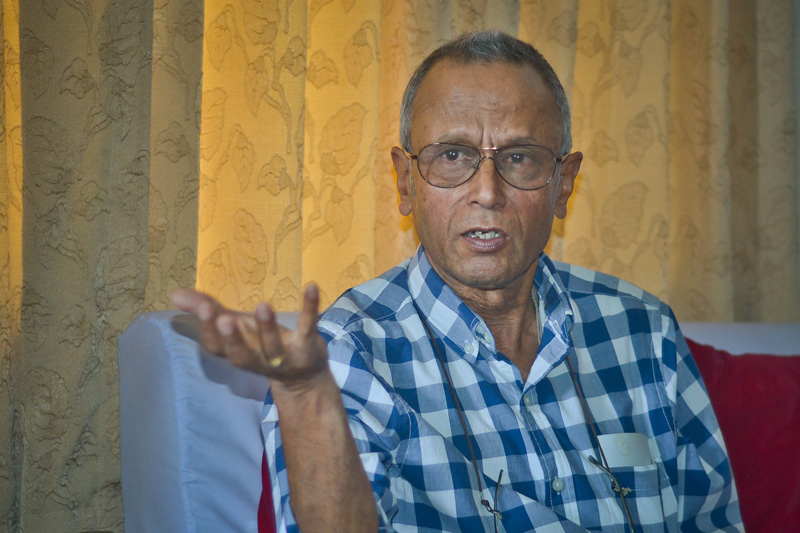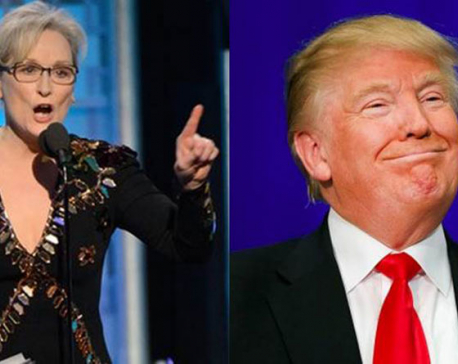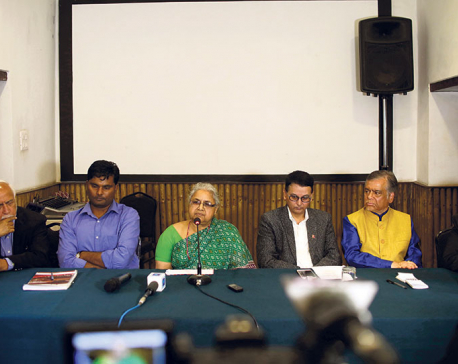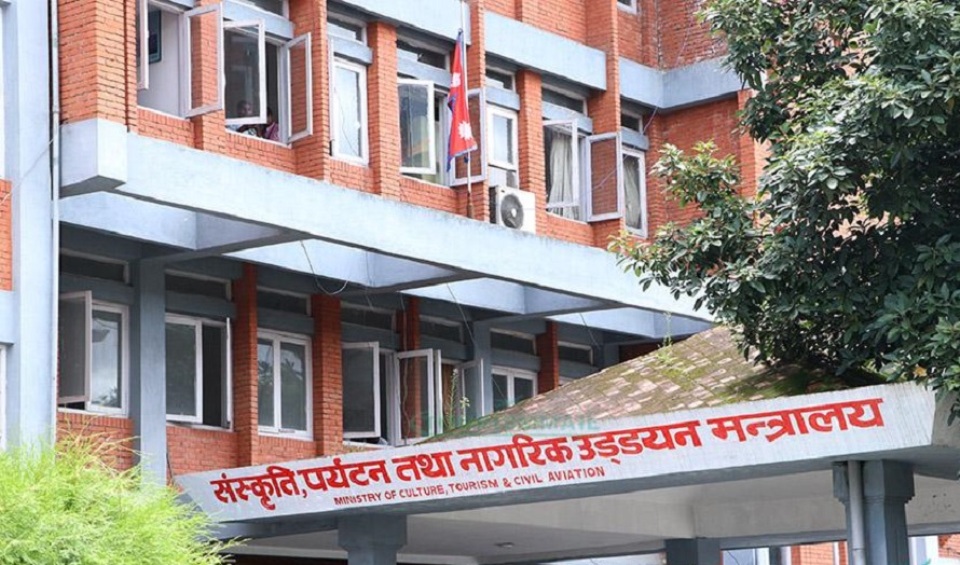
OR
Thursday Talk
Karki is innocent until she is indicted and parliament approves the indictment
Published On: May 4, 2017 05:00 AM NPT By: Republica | @RepublicaNepal

The impeachment motion against Chief Justice Sushila Karki on Sunday shocked the country. This was because Chief Justice Karki was seen as someone of high moral standing and someone not afraid to make controversial decisions, for instance in the case of former CIAA chief Lokman Singh Karki. So why did the ruling parties initiate the impeachment motion against her? Does the decision have any substance? And what are its legal implications? Balaram KC, former judge at the Supreme Court of Nepal and a respected voice in the legal community, shared his insights with Mahabir Paudyal.
What did Sushila Karki do to justify the impeachment motion against her?
You need to see the impeachment motion from two angles. There is such a hue and cry against the impeachment at people’s level. This may be right from people’s perspective.
But we also need to assess its constitutionality. The system we are in today is not absolute rule, like the former monarchy, where nobody can question higher authorities.
We live under a system that functions through rule of law, respects checks and balances honors the principle of separation of powers among state bodies, and upholds the independence of judiciary.
We live in a country today where everything is guided by written constitution and where nobody is above the law. If we say a chief justice cannot be impeached, that will be against the fundamentals of democracy. In a democracy, the judiciary is independent but the parliament is also sovereign. Simply being a senior judge does not make one immune to impeachment.
Are you hinting that government decision to impeach CJ Karki was right?
I am not saying that at all. I am telling you about the constitutionality of the impeachment process. Constitutionally, you cannot question this move. But this step seems politically motivated, which is what makes it controversial. An impeachment must not be politically motivated nor should it come as revenge against the judgment of the court. If every judgment is questioned by the parliament no judge can function impartially and independently. Court judgment or verdict cannot be made a basis for impeachment because every verdict, in itself, is the interpretation of the constitution and the only authority to interpret the constitution is the judiciary. When a judge is appointed by the Judicial Council, he or she becomes independent there and then. No parliament can question their regular performance, let alone start the process of impeachment, except when the grounds for impeachment are valid.
What are those valid grounds by standing on which a chief justice can be questioned or impeached?
If the chief justice is involved in misconduct, or proves to be inefficient and incompetent or if that person violates the law and the constitution, then the parliament can initiate the process of impeachment.
What then is your reading of the charges that have been leveled against Karki?
We have to examine these charges separately. The government has cited the court verdict on IGP appointment as one reason. This cannot be justified. This particular verdict was issued by a five-member bench of which CJ Karki was only one member. And you cannot question this verdict for it was a good judgment. It provides good guidelines to state institutions, that they should cite valid reasons for appointment or promotion of an official to higher public post. The judgment on IGP has tried to discipline public authorities and it has also set good precedent that every promotion or appointment should be based on merits. The parliament has no business dictating how the Supreme Court should form the bench, which judges are to be included in it and whom a particular case is assigned to. This is the prerogative of the chief justice. Thus the charge that CJ Karki formed benches arbitrarily does not hold much water.
The government has accused Karki of underperformance and even inefficiency. Again this has no basis. The same parliament had confirmed her as a competent and qualified person to lead the Supreme Court. The parliamentary hearing committee had also endorsed her name. You cannot question the competence of the chief justice whom you have judged to be best qualified for the job only a year ago. Besides, since she took office, she has been doing her job well. The charge of misconduct is another false accusation. Sushila Karki is someone who is intolerant about corruption. She is a person of high moral integrity. To sum up, none of the charges like the verdict related to IGP, formation of benches, inefficiency and misconduct can be the basis for the impeachment process.
What about other allegations made against her?
The allegation that Karki deliberately manipulated work performance evaluation in IGP case is superficial. Regarding groupism among judges, interference in justice delivery of other judges, violation of constitution and tarnishing the image of the judiciary, these are not things a few parliamentarians can decide on. Only an 11-member impeachment recommendation committee to be formed under Article 101 of this constitution can do so.
This committee has not been formed yet. When it is formed, the committee collects evidence and studies them rigorously before passing the judgment. If this committee finds some prima facie evidence and indicts the chief justice, only then the motion reaches the parliament for final verdict. Karki’s case has not even reached the stage of indictment.
From our conversation so far there does not seem to be one valid reason for her impeachment.
There is one but those seeking her impeachment apparently are not aware of it. This is related to the Judicial Council. According to the constitution, there should be five members in the council, of which three are ex-officio members. They are the senior-most judge of the Supreme Court, the Chief Justice, and the Law Minister. Representatives of Prime Minister and Nepal Bar Association are other members. When Kalyan Shrestha was chief justice, he had removed the representatives from the PM and the bar from the council. Sushila Karki could not be blamed for this. But when she succeeded Kalyan Shrestha as chief justice, she should have immediately given full shape to the council.
But she kept making important decisions on judge appointments even while the council had only three members. This can be cited as a case of violation of the constitution. But like I said, this again is something for impeachment recommendation committee to decide. An outsider can only give his opinion.
Some legal experts believe the constitutional provision on impeachment in itself is faulty. Do you subscribe to this view?
It is. Therefore the current 593 lawmakers who were members of the Constituent Assembly are to be blamed. Under the fundamental rights in Article 20, it says everyone shall be presumed innocent until proven guilty and only when the court convicts the person s/he will be deemed guilty. This applies for persons implicated in criminal trials as well. But in impeachment, which can never be compared with criminal case, the person accused of wrongdoing just by few members of parliament is subjected to immediate suspension, even before the charges leveled against that person are proven.
Chief justice is presumed innocent until the impeachment recommendation committee indicts her and full house of parliament approves this. Yet, she has been suspended from her duty even though she is still presumed to be innocent. Our constitutional provision on impeachment is so defective that the moment one-fourth of the parliament initiates impeachment process, on grounds that may or may not be justified, the person in question is automatically suspended. Karki is in suspended animation, though impeachment recommendation committee has not been formed yet, nor has it started the process of investigation. How can you justify the constitutional provision that suspends vital constitutional functionaries simply on the basis of suspicion of wronging by some parliamentarians? The framers of the constitution did not consider the repercussion of such a provision. The chief justice has become its victim. If there was no such provision of automatic suspension, she would get the chance to deal with her pending cases.
As someone who has worked with Karki, how do you evaluate her?
There are only four chief justices in Nepal who have displayed strong commitment to justice and zero-tolerance for corruption. They are Ram Prasad Shrestha, Bishwa Nath Upadhyay, Kedar Nath Upadhyay and Sushila Karki. It is thus unfortunate that such a person has not been allowed to work for full term. But like I said, I blame the constitution and those who framed it for this. Why did they enshrine a provision whereby a chief justice is automatically suspended the moment an impeachment motion is filed against her? Instead, why not have a provision whereby the chief justice is suspended only when charges against her are proven? Article 101 (6) of this constitution is faulty. If there was no such provision, CJ Karki would be coming to the court regularly and would be giving her verdicts in some much-awaited cases.
Sushila Karki was reportedly under tremendous pressure to bend the rules. In your experience, where does this pressure come from?
Political pressures on judges and the judiciary are unlawful. So such pressures do not come through official channels. Leaders themselves do not get involved. They mobilize their middlemen and brokers. How to deal with such pressure depends on individual judges. A judge should be able to say, ‘I have taken oath under the constitution to uphold the constitution and deliver justice and therefore I cannot violate my own oath and constitution.’ He should be able to tell the pressure groups that he cannot help them.
Some others try to influence judges by offering money. To them, a judge should be able to say ‘I’m a human being not a goat, don’t try to buy me. Next time do not even enter my house.’ I had to deal with such situations many times.
An honest judge always keeps himself above political fray. Ram Prasad Shrestha did so.
Leaders came to visit him even before he was appointed chief justice. He declined to meet any of them. If anyone tried to influence the verdicts, he would politely reprimand them. He would not even speak to them on the phone. Sushila Karki is another such person. She is such a clean person that it would be a sin to accuse her of misconduct or corruption. She is a person of high moral integrity.
The impeachment provision in the constitution has been invoked for the second time in under a year. What do we make of it? Can we say this is an abuse of the constitution?
We have seen that there is a possibility for such abuse. But there are ways to prevent it too. First, the parliament should amend Article 101(6) of this constitution whereby the person against whom impeachment is initiated is immediately suspended. Besides, political parties should learn to think about possible repercussions of their actions. They need to be mindful of the political cost of their action. For example, how will Congress and Maoist party justify this move if the impeachment recommendation committee acquits Karki?
Political parties should stop seeing impeachment as a tool to prosecute those they don’t like. Political pressure should be no basis for prosecution. So use of impeachment is as much as moral question as it is a legal or a constitutional question. Only renowned experts who are fully conversant with separation of powers; with powers and jurisdictions of the judiciary, the executive, the parliament, and the chief justice; and those who are not biased should be inducted in impeachment recommendation committee. When such committees start acquitting innocent people, political parties will be discouraged from initiating impeachment simply because they do not like some office bearers. At the moment, the parliament must immediately form an impeachment committee and allow it to work freely, fairly and independently.
You May Like This

Meryl Streep is not an ‘overrated actor’ Donald Trump, she is the most decorated
President-elect Donald Trump took to Twitter on Monday, calling Meryl Streep “one of the most over-rated actresses in Hollywood” following... Read More...

Why does she think she is ugly?
“I thought it was cruel for other people to have to see my face, that it really is disgusting,” says... Read More...

This is a govt of tyrants, feudalists and mafia: Ex-CJ Karki
KATHMANDU, July 4: Citing the government’s blatant apathy toward Dr Govinda KC’s agenda for medical education reform and Ganga Maya Adhikari’s... Read More...









Just In
- Govt amends nine laws through ordinance to attract investors
- NRM to announce two citizen heroes today
- Federal capital Kathmandu adorned before Qatar Emir's State visit to Nepal
- Public transport to operate during Qatari king’s arrival, TIA to be closed for about half an hour
- One arrested from Jhapa in possession of 43.15 grams of brown sugar
- EC to tighten security arrangements for by-elections
- Gold price drops by Rs 2,700 per tola
- Seven houses destroyed in fire, property worth Rs 5.4 million gutted







Leave A Comment